View this page in 103 different languages!
12 Felony Forgeries against Jesus Christ
The Felony Forgery of Philippians 2:19 Article Outline:
- Introduction
- At least 3 of the oldest biblical manuscripts verify the felony forgery of Philippians 2:19
- All forgeries violate the commandments of God!
- 4 felony forgeries & false doctrines against Jesus Christ and the mystery
- Hope or trust?
- How do figures of speech help us trust in the living God?
- Who do we trust? The effects of the Philippian forgery: Ye shall know them by their fruit
- Trust in God through Christ and not in Jesus alone!
- Why shouldn't we pray to Jesus?
- 10 Point Summary
INTRODUCTION
There are only 2 verses in the entire bible that contain the words "trust" and "Jesus" [kjv].Mark 10:24
And the disciples were astonished at his words. But Jesus answereth again, and saith unto them, Children, how hard is it for them that trust in riches to enter into the kingdom of God!
Philippians 2:19 [KJV]
But I trust in the Lord Jesus to send Timotheus shortly unto you, that I also may be of good comfort, when I know your state.
For your convenience, these 2 words are bolded and italicized, but to be clear, these words are NOT italicized in the King James Version!
Words that are italicized in the King James Version are not done so for emphasis, but rather to let you know these have been purposely added to the text.
The reason is so that we can differentiate between what is God's word and what is man's word; an extremely important biblical research task!
The translators of the King James Version of the bible probably meant well [but you never know for sure].
However, it is only a general guideline and is no guaranty of accuracy or truth.
There are lots of exceptions that they don't tell you about [i.e. mistranslations and deliberate Felony Forgeries]
The Felony Forgery of Philippians 2:19 is not your average forgery. We have to dig much deeper than usual in order to detect it, which highlights the importance of sound biblical research.
Unique usages of words or phrases are very common among all the other trinitarian forgeries in the bible, such as is the case of the forgery of Matthew 28:19.
At least 3 of the oldest biblical manuscripts verify the felony forgery of Philippians 2:19
Clear and solid evidence of yet another early trinitarian forgery exists if you are willing to dig a little deeper.This first screenshot is from the Codex Sinaiticus, the oldest complete copy of the Greek New Testament, dating back to the 4th century [if you go to the Codex Sinaiticus website, check the lower right quadrant of the screen and scroll down to Philippians 2:19].
As you can plainly see, it does not have the word "Jesus" in it!
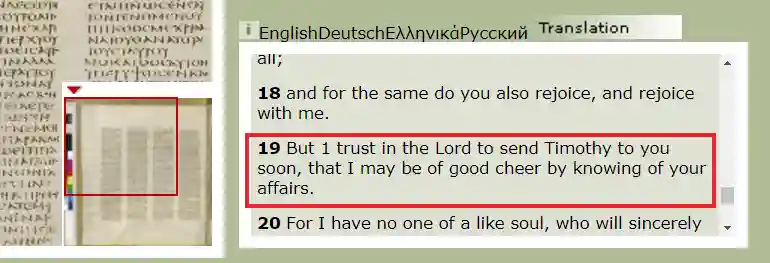
The Codex Vaticanus, believed to be from the 4th century also, is the oldest nearly-complete copy of the entire Greek bible in existence [both old & new testaments].
This manuscript does not have the name of "Jesus" in it either [Ιησούς in Greek], corroborating the Codex Sinaiticus.
The 8 Greek words are: "Elpizo de en koiu Timotheo tacheos pempsai hymin" which translates to: "Moreover, I trust in [the] Lord to send Timothy to you soon..."
Due to copyright laws, I cannot reproduce it on my website, but if you can read Greek, you can see it here.
After doing further research, I found a third, even older manuscript that does not have the name of Jesus in Philippians 2:19 either!
This manuscript is called Papyrus 46, so named because its made from the papyrus plant.


Scholars date the Papyrus 46 document anywhere from 80A.D. to about 250A.D., making this one much older, more authoritative, valuable and accurate than either Codex Sinaiticus or the Codex Vaticanus [The blurred-out section is the beginning of verse 20].
The Greek words in this manuscript are: "Elpizo de en koie Timotheo tacheos pempsai hymin hina kago eupsycho gnous ta peri hymon" which translates to: "Moreover, I trust in [the] Lord to send Timothy to you soon that I also might be encouraged having known the things concerning you."
What I've found so far is that manuscripts dating before the Council of Constantinople in 381A.D., [when the doctrine of the trinity was completed and established] do not have the name of Jesus in them, but manuscripts afterward do, indicating the corrupt influence of this diabolical meeting on all future biblical texts.
You can verify this for yourself by checking out the screenshot below of the Armenian Bible which was translated from the Syriac manuscript of 411A.D.
Only 30 years after the *Constantinople Compromise* and the name of Jesus was already added to the text!

This is why we must always be diligent to verify the truth of the word.
Acts 17:11
These were more noble than those in Thessalonica, in that they received the word with all readiness of mind, and searched the scriptures daily, whether those things were so.
All forgeries violate the commandments of God!
Deuteronomy 4:2 [amplified bible]You shall not add to the word which I am commanding you, nor take away from it, so that you may keep the commandments of the Lord your God which I am commanding you.
Revelation 22
18 For I testify unto every man that heareth the words of the prophecy of this book, If any man shall add unto these things, God shall add unto him the plagues that are written in this book:
19 And if any man shall take away from the words of the book of this prophecy, God shall take away his part out of the book of life, and out of the holy city, and from the things which are written in this book.
4 FELONY FORGERIES AGAINST JESUS CHRIST AND THE MYSTERY
Here is the felony forgery theme against Jesus Christ and the mystery in 3 different books of the bible:- EPHESIANS 3:9 another felony forgery: another unauthorized addition of 3 added words: "by Jesus Christ".
- PHILIPPIANS 2:6: wrongly divided verse>>trinity teaching = doctrinal error
- PHILIPPIANS 2:19 another felony forgery: another unauthorized addition of 1 added word: "Jesus".
- COLOSSIANS 1:14-18: wrongly divided verses>>trinity teaching = doctrinal error
- GENESIS: first canonical book of the bible: false doctrine about Genesis 1:26
- JOB: first book of the bible written chronologically - Job 13:8 forgery
- PHILIPPIANS: the last book of the bible written to the body of Christ: 1 forgery & 1 false teaching
- REVELATION: last canonical & chronological book of the bible: 2 forgeries
That tells us Satan's priorities and therefore, where we need to attack him and protect ourselves by being constantly vigilant.
Both Ephesians and Philippians have felony forgeries involving Jesus Christ - no coincidence there.
Ephesians 3:9
And to make all men see what is the
This forgery corrupts the great mystery by introducing confusion, contradictions and idolatry into it by making Jesus Christ, the son of God, into the co-creator of the universe, which is pure insanity and an impossibility since Jesus Christ wasn't born until Wednesday, September 11th, 3BC.
It also corrupts the 7 "ones" listed in Ephesians 4 by adding another God:
Ephesians 4
4 There is one body, and one Spirit, even as ye are called in one hope of your calling;
5 One Lord, one faith, one baptism,
6 One God and Father of all, who is above all, and through all, and in you all.
"One God and Father of all" is listed as the 7th one; Seven is the number of spiritual perfection, so by adding Jesus Christ as God the creator, we now have 2 Gods, undoing that perfection.
This is just one of the many many ways the deity of Christ and the trinity can contaminate and corrupt the entire word of God.
None of the felony forgeries against Jesus Christ are random.
They are specifically targeted attacks against certain words, verses and concepts in the word of God.
They are specifically targeted attacks against certain words, verses and concepts in the word of God.
In Ephesians, God finally revealed the great mystery of the Judeans and Gentiles being part of the same body.
Ephesians 3
1 For this cause I Paul, the prisoner of Jesus Christ for you Gentiles,
2 If ye have heard of the dispensation of the grace of God which is given me to you-ward:
3 How that by revelation he made known unto me the mystery; (as I wrote afore in few words,
4 Whereby, when ye read, ye may understand my knowledge in the mystery of Christ)
5 Which in other ages was not made known unto the sons of men, as it is now revealed unto his holy apostles and prophets by the Spirit;
6 That the Gentiles should be fellowheirs, and of the same body, and partakers of his promise in Christ by the gospel:
7 Whereof I was made a minister, according to the gift of the grace of God given unto me by the effectual working of his power.
8 Unto me, who am less than the least of all saints, is this grace given, that I should preach among the Gentiles the unsearchable riches of Christ;
Its also significant to see that Ephesians, Philippians and Colossians are all written to strong, faithful and mature believers in the body of Christ.
That is why this forgery had to be especially subtle in order to deceive the first century church and all subsequent christians.
HOPE OR TRUST?
Philippians 2:19 [kjv]But I trust in the Lord Jesus to send Timotheus shortly unto you, that I also may be of good comfort, when I know your state.
Here is the definition of the word "trust":
Strong's Concordance #1679
elpizó: to expect, to hope (for)
Part of Speech: Verb
Phonetic Spelling: (el-pid'-zo)
Definition: to expect, to hope (for)
Usage: I hope, hope for, expect, trust.
HELPS Word-studies
Cognate: 1679 elpízō (from 1680 /elpís, "hope") – to hope, actively waiting for God's fulfillment about the faith He has inbirthed through the power of His love (cf. Gal 5:6 with Heb 11:1). See 1680 (elpis).
This Greek word Elpizo is used 31 times in the NT.
In the KJV, 18 times Elpizo is translated in the essence of trust [58.06%] and 13 times its in the essence of hope [41.93%].
Now if you look at "A critical lexicon and concordance to the english and Greek new testament" by E.W. Bullinger, on page 823, it defines the Greek word Elpizo as: "to expect; to hope; with an object, to long for and expect a thing with real or fancied probability; without an object, to set one's hope upon something".
Finally, the Theological Dictionary of the New Testament by Gerhard Kittel [10 volume set] is arguably one of the most authoritative sources on the market.
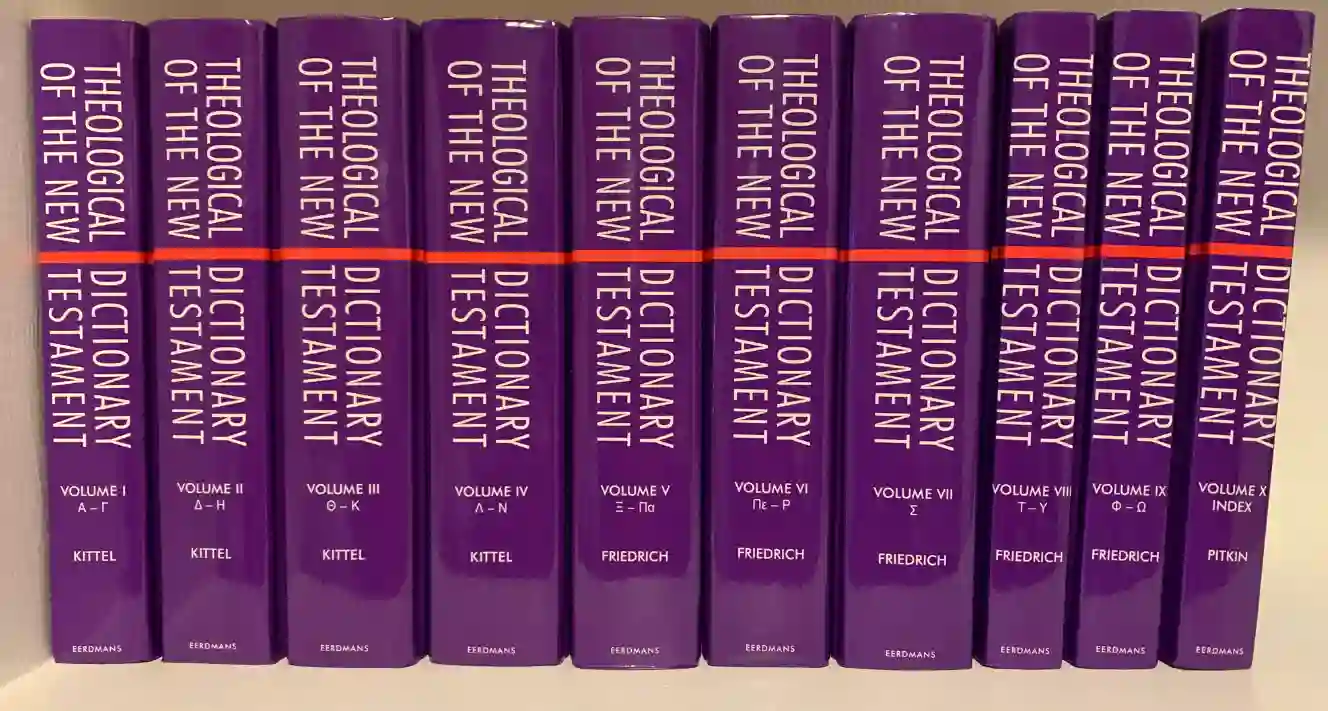
In Volume II, page 530, it confirms the meaning of the Greek word Elpizo as that of hope in Philippians 2:19.
Furthermore, this word Elpizo comes from the root word elpis [Strong's #1680] and it has the meaning of hope; expectation of what is sure and certain.
So in the context of Philippians 2:19 and from multiple objective and authoritative references, hope fits better than trust.
How do figures of speech help us trust in the living God?
Another way to find out whether or not the word "Jesus" should be in Philippians 2:19 is to look at the structure of the entire book from the Companion Study Reference Bible by E.W. Bullinger.This has the figure of speech called introversion, where:
ABCD corresponds to
ABCD.
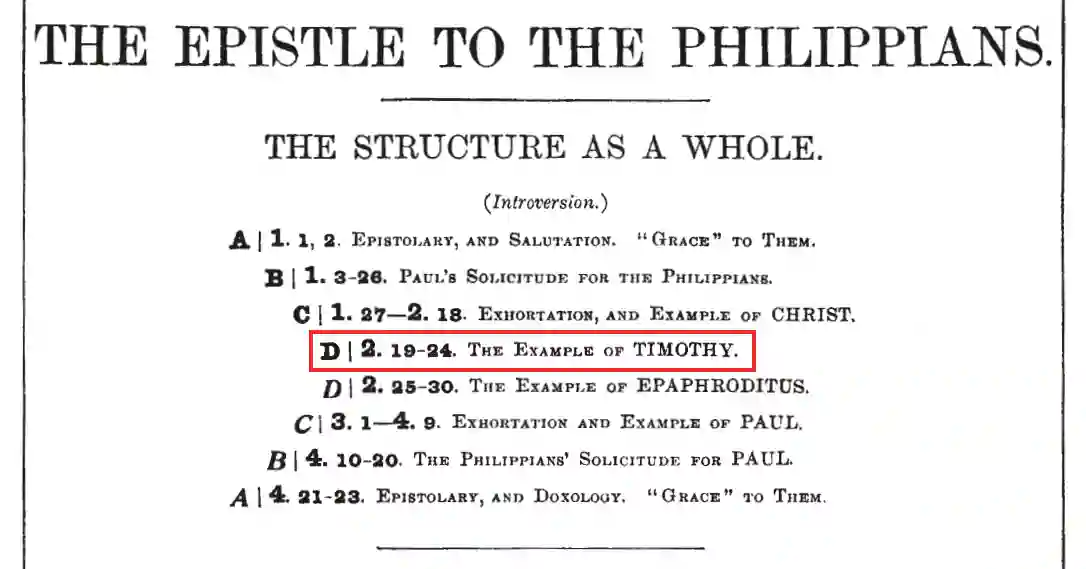
Since this section is all about Timothy, the logical thing to do is check the books of I & II Timothy to see what they say about trust.
The word "trust" isn't used in II Timothy [kjv], but it is used in I Timothy 5 times, 3 of which are relevant to this article.
1 Timothy 4:10
For therefore we both labour and suffer reproach, because we trust in the living God , who is the Saviour of all men, specially of those that believe.
1 Timothy 5:5
Now she that is a widow indeed, and desolate, trusteth in God , and continueth in supplications and prayers night and day.
1 Timothy 6:17
Charge them that are rich in this world, that they be not highminded, nor trust in uncertain riches, but in the living God , who giveth us richly all things to enjoy;
The book of I Timothy never mentions trusting in Jesus, only in God!
From one point of view, there are only 2 fundamental ways the bible interprets itself: in the verse or in the context.
The section about Timothy in the second chapter of Philippians is from verses 19-24, so let's see how verse 19 interprets itself in its context.
Philippians 2
19 But I trust in the Lord Jesus to send Timotheus shortly unto you, that I also may be of good comfort, when I know your state.
20 For I have no man likeminded, who will naturally care for your state.
21 For all seek their own, not the things which are Jesus Christ's.
22 But ye know the proof of him, that, as a son with the father, he hath served with me in the gospel.
23 Him therefore I hope to send presently, so soon as I shall see how it will go with me.
24 But I trust in the Lord that I also myself shall come shortly.
This entire section on Timothy begins and ends with trusting in the Lord [God].
Accurately translated, look at the perfect balance and symmetry of how these 6 verses precisely correspond to each other!
Philippians 2
19 But I trust in the Lord to send Timotheus shortly unto you, that I also may be of good comfort, when I know your state.
24 But I trust in the Lord that I also myself shall come shortly.
20 For I have no man likeminded, who will naturally care for your state.
23 Him therefore I hope to send presently, so soon as I shall see how it will go with me.
21 For all seek their own, not the things which are Jesus Christ's.
22 But ye know the proof of him, that, as a son with the father, he hath served with me in the gospel.
With the correct translation of Philippians 2:19 from the most ancient texts, both I Timothy and this section on Timothy, the bible mentions trusting in God instead of Jesus 5 times!
Who do we trust? The effects of the Philippian forgery: Ye shall know them by their fruit
This word "Jesus" is actually in almost all the modern bible versions I've checked [29 out of 30 = 96%].The only one that didn't have the name of Jesus in it is The Living Bible.
Below is the information on TLB from www.biblegateway.com
"The Living Bible is a paraphrase of the Old and New Testaments. Its purpose is to say as exactly as possible what the writers of the Scriptures meant, and to say it simply, expanding where necessary for a clear understanding by the modern reader".
Philippians 2:19 [The Living Bible]
If the Lord is willing, I will send Timothy to see you soon. Then when he comes back, he can cheer me up by telling me all about you and how you are getting along.
What effect do the modern bible versions of Philippians 2:19 have on Christians today?
Matthew 7
17 Even so every good tree bringeth forth good fruit; but a corrupt tree bringeth forth evil fruit.
18 A good tree cannot bring forth evil fruit, neither can a corrupt tree bring forth good fruit.
19 Every tree that bringeth not forth good fruit is hewn down, and cast into the fire.
20 Wherefore by their fruits ye shall know them.
Just as we can see the good or bad fruit in a person's life, so we can see the good or bad effect of sound doctrine vs wrong doctrine.
First, as Philippians 2:19 says, they would trust in Jesus. Then, before you know it, they would be confiding in Jesus. And praying TO Jesus [usually as God], which contradicts many verses, like the ones below.
Ephesians 5:20
Giving thanks always for all things unto God and the Father in the name of our Lord Jesus Christ;
Matthew 4:10
Then saith Jesus unto him, Get thee hence, Satan: for it is written, Thou shalt worship the Lord thy God, and him only shalt thou serve.
Even in the Lord's Prayer, Jesus Christ is telling the Israelites to pray to our heavenly father and not himself.
Matthew 6:9
After this manner therefore pray ye: Our Father which art in heaven, Hallowed be thy name.
Next they'll be praising Jesus and worshiping Jesus [as God], which is idolatry, which is worshiping anything or anybody instead of God.
Based upon the consequences alone, this forgery of Philippians 2:19 cannot be from God.
Do you see how subtle this trick is?
The best counterfeits are always in a religious context and they are usually very effective on most Christians.
There is a distinct possibility that this forgery was inspired by a devil spirit of whoredoms, which causes people to worship other gods.
There is a distinct possibility that this forgery was inspired by a devil spirit of whoredoms, which causes people to worship other gods.
Is Jesus trustworthy?
Absolutely.
He's a perfect man who always did the father's will, and still is today, as an intercessor and mediator between God and man.
However, as the 2 screenshots below testify, the will of God is to trust in God, not Jesus.
There are 69 verses in the bible that contain the root word "trust" and the word "Lord" and none of them tell us to trust in the Lord Jesus, with the one exception of the Felony Forgery of Philippians 2:19!
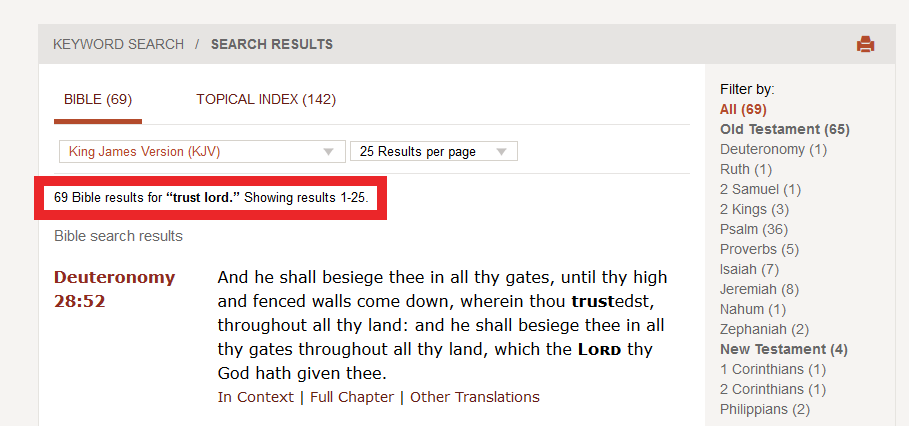
There are also 52 verses in the bible that have the root word "trust" and the word "God" and none of them tell us to trust in Jesus either!
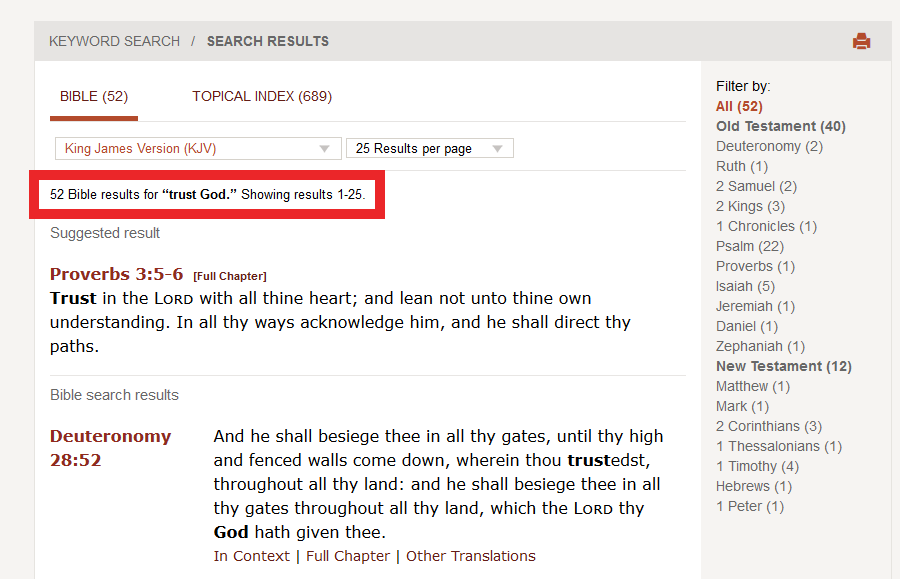
There are a total of 121 verses in the bible that have the words "trust" and "God" or "trust" and "Lord" and NONE of them tell us to trust in Jesus!
The proper attitude should be to give thanks TO God FOR Jesus Christ.
By way of the structural figure of speech for the book of Philippians, since the section in Philippians 2:19-24 [about Timothy] corresponds to Philippians 2:25-30 [about Epaphroditus], we could look there for additional clues.
Since Philippians 2:25-30 is about Epaphroditus, we could check up on his name.
It is only used twice in the entire bible and in those contexts, it only mentions God:
Philippians 4:18
But I have all, and abound: I am full, having received of Epaphroditus the things which were sent from you, an odour of a sweet smell, a sacrifice acceptable, wellpleasing to God.
Philippians 2
25 Yet I supposed it necessary to send to you Epaphroditus, my brother, and companion in labour, and fellowsoldier, but your messenger, and he that ministered to my wants.
26 For he longed after you all, and was full of heaviness, because that ye had heard that he had been sick.
27 For indeed he was sick nigh unto death: but God had mercy on him; and not on him only, but on me also, lest I should have sorrow upon sorrow.
28 I sent him therefore the more carefully, that, when ye see him again, ye may rejoice, and that I may be the less sorrowful.
29 Receive him therefore in the Lord with all gladness; and hold such in reputation:
30 Because for the work of Christ he was nigh unto death, not regarding his life, to supply your lack of service toward me.
Jesus isn't mentioned once [but Christ is].
PRACTICAL ERROR IN THE CHURCH
Below is a screenshot of the Companion Reference Bible on the structure of the 7 church epistles [Romans - Thessalonians], with the role that the book of Philippians plays in it.
It is a book of reproof, which fixes the practical error that had slowly and subtly contaminated the church.
![Screenshot of the Companion Reference Bible on the structure of the 7 church epistles [Romans - Thessalonians].](https://biblebookprofiler.com/images/screenshot-companion-bible-7-church-epistles.webp)
Ironically, the Felony Forgery of Philippians 2:19 subverts Philippians' purpose of removing practical error by inserting it.
The Felony Forgery of Philippians 2:19 contradicts Philippians' purpose of fixing this error by actually introducing it into scripture because it tells believers to trust in Jesus alone, which usually leads them to pray to him and worship him as God the son, a phrase that NEVER occurs in holy scripture.
This is just one of countless examples of practical error that Philippians is designed to fix.
As we can see from the companion bible, Philippians is based upon the doctrine of Ephesians.
Trust in God through Christ and not in Jesus alone!
One of the many ways the bible interprets itself is that all verses on the same subject must be in agreement.So if you have 100 verses on subject x, but 5 verses seem confusing or contradictory to the other 95, we shouldn't build an entire doctrinal system around the few confusing ones, but rather do further research on them to see how they fit into the majority.
Just look at the many clear and complementary verses to remove any confusion or doubt you may have with a questionable verse, as demonstrated below.
2 Corinthians 3:4 is the only verse in the bible that contains both words "trust" and "Christ".
2 Corinthians 3:4
And such trust have we through Christ to God-ward:
There is still no trusting in Jesus alone as the final object of our trust, but towards God, through Christ, because he is the mediator between God and man.
* Trusting in God through Christ the mediator is the correct biblical action.
* Trusting in Jesus alone [usually as God] is the world's religious counterfeit of that trust.
Look at the definition of the word "through":
HELPS Word-studies
1223 diá (a preposition) – properly, across (to the other side), back-and-forth to go all the way through, "successfully across" ("thoroughly"). 1223 (diá) is also commonly used as a prefix and lend the same idea ("thoroughly," literally, "successfully" across to the other side).
Ultimately, the trust is in God, as the 121 verses demonstrate.
However, there is still one more verse to clarify.
Ephesians 1:12
That we should be to the praise of his glory, who first trusted in Christ.
This word "trusted" is the Greek word proelpizó [Strong's #4276], which means "to hope before".
The NET [New English Translation] bible translated this verse as follows:
Ephesians 1:12
So that we, who were the first to set our hope on Christ, would be to the praise of his glory.
So there is still no trusting in Jesus or even Christ alone.
Jesus Christ is the only true hope for mankind.
When it comes to hope, there are only 3 categories:
- True hope
- False hope
- No hope
OR
No hope.
Ephesians 2:12
That at that time ye were without Christ, being aliens from the commonwealth of Israel, and strangers from the covenants of promise, having no hope, and without God in the world:
Deuteronomy 30:19
I call heaven and earth to record this day against you, that I have set before you life and death, blessing and cursing: therefore choose life, that both thou and thy seed may live:
Why shouldn't we pray to Jesus?
John 16:23
And in that day [future—after Jesus Christ’s ascension and the day of Pentecost in 28AD] ye shall ask me nothing. Verily, verily, I say unto you, Whatsoever ye shall ask the Father, in my name, he will give it you.
WHY?
John 5:19
Then answered Jesus and said unto them, Verily, verily, I say unto you, The Son can do nothing of himself, but what he seeth the Father do: for what things soever he doeth, these also doeth the Son likewise.
And in that day [future—after Jesus Christ’s ascension and the day of Pentecost in 28AD] ye shall ask me nothing. Verily, verily, I say unto you, Whatsoever ye shall ask the Father, in my name, he will give it you.
WHY?
John 5:19
Then answered Jesus and said unto them, Verily, verily, I say unto you, The Son can do nothing of himself, but what he seeth the Father do: for what things soever he doeth, these also doeth the Son likewise.
This is the great precision of God's word: we are not to trust in Jesus alone, [as that could lead to idolatry as explained earlier], but in God, our heavenly father.
See "376 reasons why we should praise God, not Jesus!" for more insights on this subject.
SUMMARY
- Introduction:
This forgery requires more in-depth research than most of the others, indicating how well Satan has hidden it from the faithful in Christ. - 3 Biblical manuscripts:
At least 3 of the most ancient biblical manuscripts verify the felony forgery of Philippians 2:19; the Codex Sinaiticus, the Codex Vaticanus and Papyrus 46
So far, all the biblical manuscripts before the Council of Constantinople in 381A.D. do not have the name of Jesus in them, but afterward, they do, indicating the corrupt influence the trinity has had on the felony forging of the bible. - All biblical forgeries violate the commandments of God
Adding the name of "Jesus" to Philippians 2:19 is a clear and direct violation of the commandments of the Lord God Almighty! - 4 Felony Forgeries & false doctrines against Jesus Christ and the mystery:
There are a combination of 4 forgeries and false doctrines against Jesus Christ and the mystery in the 3 books of Ephesians, Philippians and Colossians that ultimately target the mystery which has been hid for all ages until the first century. - Hope or trust?:
The word "trust" in the KJV is more accurately translated "hope" by checking the context and multiple objective and authoritative biblical reference works. - Figures of speech:
The figure of speech called "introversion" for the entire book of Philippians reveals that the subject of Philippians 2:19-24 is Timothy. The book of I Timothy verifies that we are to trust in the living God instead of Jesus. - Who do you trust? Ye shall know them by their fruits
The effect of the Felony Forgery of Philippians 2:19 is to encourage people to trust in Jesus alone, confide in him, pray to him [usually as God the son], worship him, etc, which is a clear contradiction of biblical doctrine and practice. - Trust in God thrugh Christ and not in Jesus alone!:
2 Corinthians 3:4>> And such trust have we through Christ to God-ward:
- Why shouldn't we pray to Jesus?:
The collective directives of Matthew 4:10, Matthew 6:9, John 5:19, John 16:23, Ephesians 5:20, Colossians 1:12 & 3:17 tell us to pray directly to God in the name of Jesus Christ, which is what the messiah taught us himself.
- The final Conclusion:
Its very clear that the word "Jesus" was deliberately inserted into Philippians 2:19 after the Council of Constantinople in order to:
- Corrupt the word of God
- Compromise believer's beliefs
- Transfer the believer's trust in God to trust in Jesus
- Cause Christians to not be approved by God by wrongly-dividing his word [II Timothy 2:15]
- Move people towards the trinity, confusion and idolatry